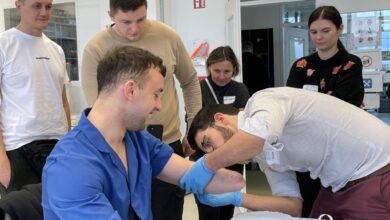By Brittany K. Jackson, Contributing Writer
“It’s hard to find a killer when everyone’s a crook” is the moniker that describes USA Network’s newest show, “Briarpatch,” a murder mystery meets killer feminine energy and kick-a** content.
The anthology series’ has a literary origin written by Ross Thomas and features the leading role as a man, but “Briarpatch” program creator Andy Greenwald had other plans, imploring veteran actress Rosario Dawson to take reign as the lead in the USA Network series. Referenced by the cast as a “modern-day murder mystery, Dawson stars as Allegra Dill, a seasoned criminal investigator who’s ready to face her fears and find out who killed her beloved sister. Returning to her roots in San Bonifacio, Texas, Dawson’s character is set to turn the town upside down with drilling truth and a unique twist of thrill, mystery, crime and pulp fiction.
In an exclusive, I asked the “Luke Cage” actress just how important this character is for her as a woman of color being casted in a lead investigative role. Dawson says she believes “representation is important, but also ownership” and that serving as not only the lead, but as a producer, all while having a female director on the project added to the overall vision.
“We’re just people who are contributing our talents, and our experience and our ideas and having spaces where that is respected,” Dawson added.
Dawson also credits Greenwald for having the wherewithal to change the scope of stories generally sculpted for highly predictable candidates, White men.
“We’ve seen the murder mystery with the white guy, over and over and over again. We’ve seen him be able to grapple with the loss of family members, but I couldn’t think of anytime I’ve seen a woman do it,” Dawson proclaimed.
Highlighting the 100 years that women’s suffrage has been enacted and the recent 400-year anniversary of slavery, Dawson says “we’re still pushing for equality.” “I think that there are a lot of stories, a lot of perspectives and narratives that need shifting,” she said. “The controls of our culture have been dominated for a very long time, from a very specific perspective and now with how much things have changed, with technology and with access and the spaces that need more and more content, there’s just different voices that are allowed to rise,” Dawson continued. “We’re no longer going, ‘you need to create what that is,’ it’s actually, ‘you tell your own story,’ I don’t have to tell it from my perspective for you.”
Dawson added that “culture precedes legislation” and that we must “continue to push back on the gate keepers of culture” in order to change how women and people of color are represented in the boardroom, the studios, in the arts and with whom gives the green light.
This article originally appeared in The Los Angeles Sentinel.





